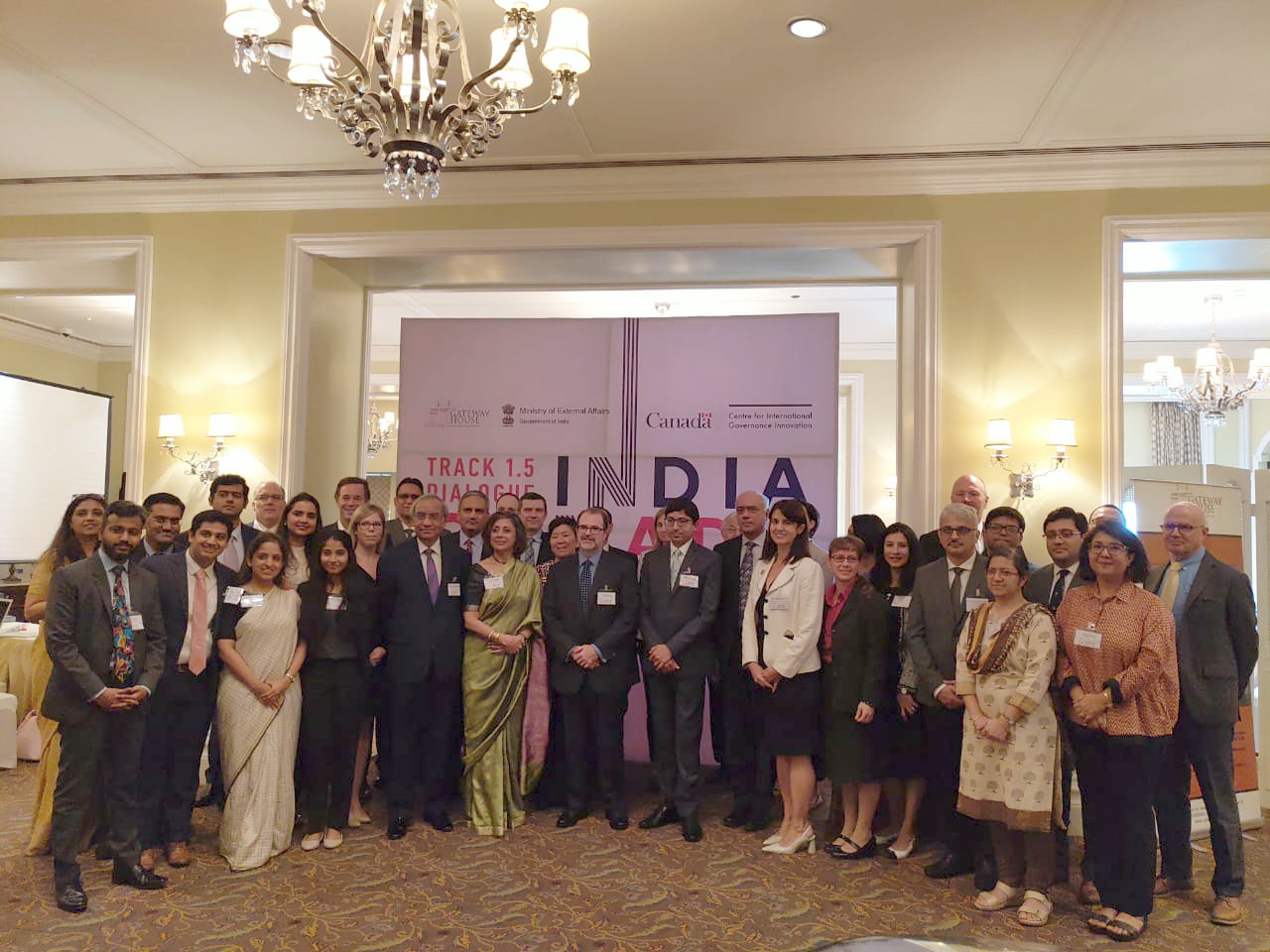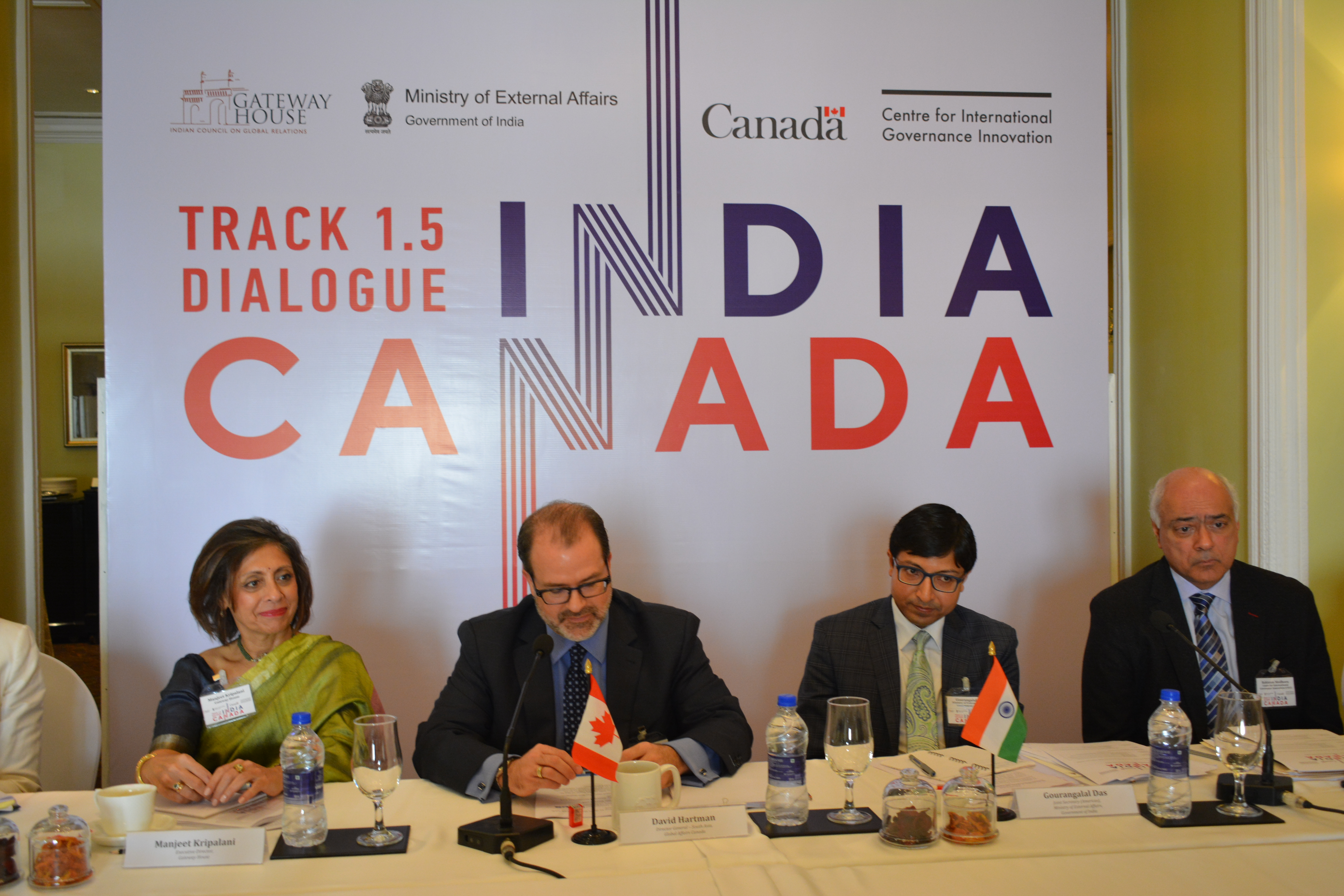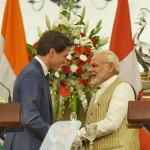Gateway House hosted the second edition of the India-Canada Track 1.5 Dialogue in Mumbai on 22 November 2019. Senior officials of the Canadian and Indian governments, scholars, experts, business and financial leaders from the two countries participated in discussions, which are certain to advance mutual understanding and cooperation on a range of important issues.

Conceived and designed jointly by two prestigious think tanks, Gateway House: Indian Council on Foreign Relations, Mumbai, and the Centre for International Governance Innovation (CIGI), Waterloo, Ontario, the India-Canada Track 1.5 Dialogue was launched in Mumbai in February 2018. This coincided with Prime Minister Justin Trudeau’s state visit to India. CIGI hosted the first, foundational edition of the Dialogue in Ottawa in October 2018.
The second edition in Mumbai last month became an occasion for policymakers to highlight the contours of the natural partnership between Canada and India and for experts to come up with a package of practical proposals to further strengthen bilateral cooperation. They responded constructively to a special message from Dr. S. Jaishankar, External Affairs Minister, who said that these discussions should generate “new energy, synergy and ideas that both governments can benefit from”.

The four key people piloting the Dialogue were: David Hartman, Director General, Global Affairs Canada; Gourangalal Das, Joint Secretary (Americas), Ministry of External Affairs, Government of India; Rohinton Medhora, President, CIGI; and Manjeet Kripalani, Executive Director and Co-Founder, Gateway House. About 50 distinguished participants, all experts in their own fields, agreed that while the bilateral relationship was moving in a positive direction, the changing global environment and an objective assessment of the two countries’ mutual interests made it essential for them to work harder – and with imagination – on the ongoing diversification and growth of the strategic partnership.
The Mumbai discussions yielded the following outcomes:
1) The two governments, each armed with a fresh mandate from elections held in May and October 2019, plan to focus on expanding dialogue and cooperation through a purposeful process of re-engagement, encompassing political, security, economic and other sectors of mutual benefit.
2) The Indo-Pacific dimension of India’s foreign policy is of considerable interest to Canada. As a Pacific power, Canada is deeply interested in increasing its political and economic linkages with the region. This may be advanced through bilateral discussions and by involving interested third countries.
3) The India-Canada economic partnership has been performing well, but it needs to be realised optimally through a practical blueprint, which covers trade, technology, investment, innovation and MSMEs.
4) Energy, digital trade and governance, environment and education will require sustained attention from policymakers and corporate entities.
5) The Canada-India relationship is driven by people. Effective measures to strengthen cooperation at their level and promote the welfare of students, tourists, business persons and diaspora will be implemented.
6) India’s G20 presidency in 2022 offers a valuable opportunity for the two countries’ policy perspectives to converge; the actual task of widening and deepening the relationship to accommodate such convergence needs to begin now.
The Mumbai Dialogue ended on a positive, even exuberant note, with a clear consensus among participants that all stakeholders have “a lot of work to do together in the immediate future”.
Rajiv Bhatia is Distinguished Fellow, Foreign Policy Studies Programme, Gateway House. A former consul general in Toronto, he served as ambassador to several countries.
This blog was exclusively written for Gateway House: Indian Council on Global Relations. You can read more exclusive content here.
For interview requests with the author, or for permission to republish, please contact outreach@gatewayhouse.in
© Copyright 2019 Gateway House: Indian Council on Global Relations. All rights reserved. Any unauthorized copying or reproduction is strictly prohibited.


